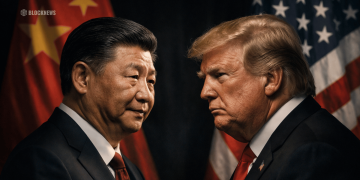- Beijing’s Municipal Science & Technology Commission has released the “Web3 Innovation and Development White Paper (2023)”, identifying Web3 as an inevitable trend for future internet development.
- Beijing’s white paper emphasizes a commitment to bolster policy support and accelerate technological breakthroughs to promote the Web3 industry.
- China’s movement towards Web3 is widespread, with at least 30 provincial and municipal governments rolling out Web3-related guidelines or policies.
In a move that signals China’s growing interest in blockchain and Web3 technologies, Beijing, the nation’s capital city, recently launched a significant white paper on Web3 innovation and development. The comprehensive document, “Web3 Innovation and Development White Paper (2023),” heralds Web3 technology as an “inevitable trend for future Internet industry development,” revealing China’s understanding of the trajectory of digital innovation.
The Beijing Municipal Science & Technology Commission, also known as the Administrative Commission of Zhongguancun Science Park, took the stage at the Zhongguancun Forum to unveil the ambitious white paper. Their goal is unequivocal: to position Beijing as a global innovation hub for the digital economy. And they’ve put their money where their mouth is. Yang Hongfu, director of the Zhongguancun Chaoyang Park management committee, announced an annual investment of at least 100 million yuan (around $14 million) into this initiative until 2025.
Regulatory Crossroads: Timing is Everything
However, the timing of the release of the Web3 white paper has not gone unnoticed. Just as Hong Kong prepares to implement new crypto rules on June 1, Beijing makes a bold step into the future of Web3. The parallel couldn’t be more striking, with Changpeng Zhao, CEO of Binance, labeling the release as “interesting.”
As Beijing forges forward, there’s a stark contrast with the tightening regulatory landscape in the US. The fact that China had previously prohibited the use of cryptocurrencies in 2021, and is now seemingly opening up to the industry through the Web3 white paper, underscores the complex dynamics in the global crypto sphere.
An Eye on the Future: Strengthening Policy Support and Technological Breakthroughs
The white paper is not just a declaration of Beijing’s plans; it underscores a commitment to strengthen policy support and fast-track technological breakthroughs to boost the Web3 industry. It pinpoints critical challenges the city faces in developing Web3 industries, such as finding the right talent, ensuring blockchain integrity, and crafting suitable laws and regulations.
Interestingly, China’s movement towards Web3 is a collaborative journey. As of April, at least 30 provincial and municipal governments across the country have released guidelines or policies related to Web3 development. But Beijing’s step is arguably the most significant, sending ripples across the globe, stirring curiosity and anticipation among investors, innovators, and policy-makers alike.
This move towards Web3 technology comes with significant potential. By merging virtual reality with the physical world, Web3 could enhance human communication and increase the efficiency of economic activities. The recognition of this potential by the Beijing government reflects a significant step towards embracing the transformative power of decentralized systems and blockchain-based solutions.
As Beijing gears up for a new chapter in its digital journey, the world watches with interest. Only time will tell how this development affects global crypto regulations, Web3 industry growth, and the future of digital innovation. But for now, Beijing is ready to embrace Web3 and take its place on the global digital stage.














